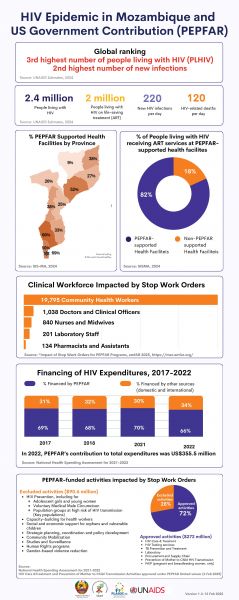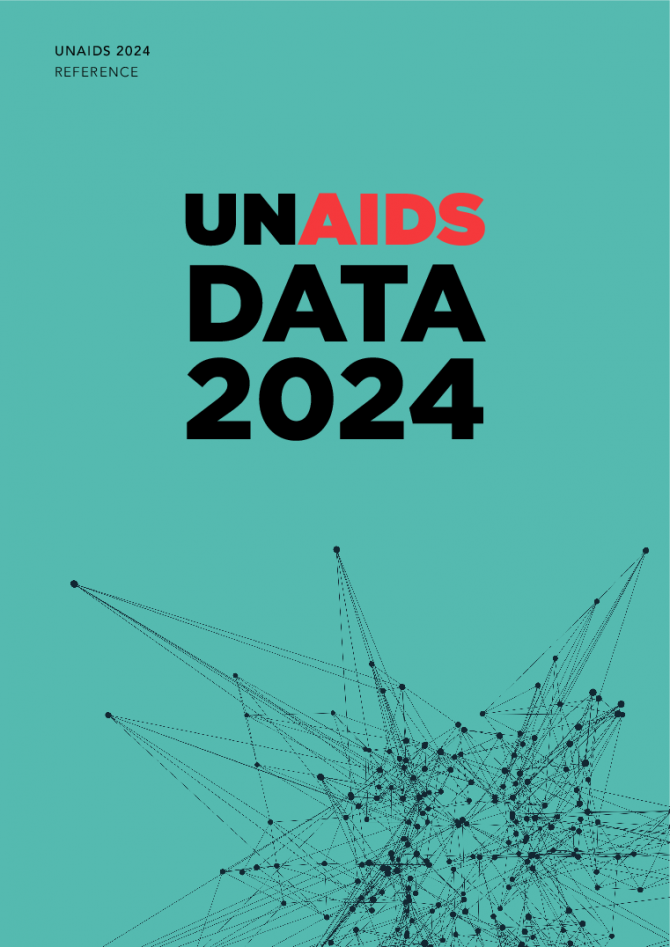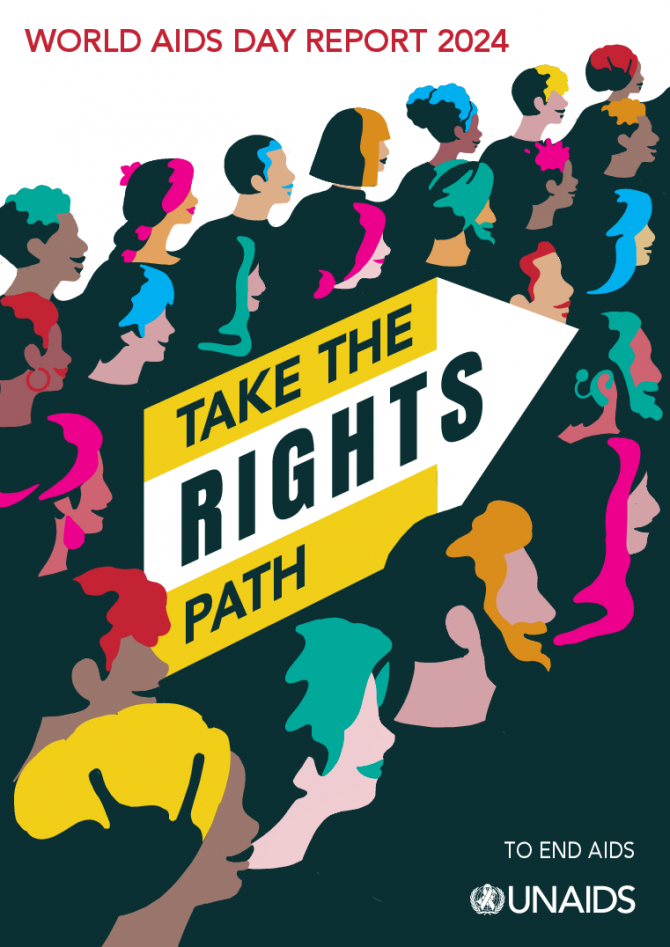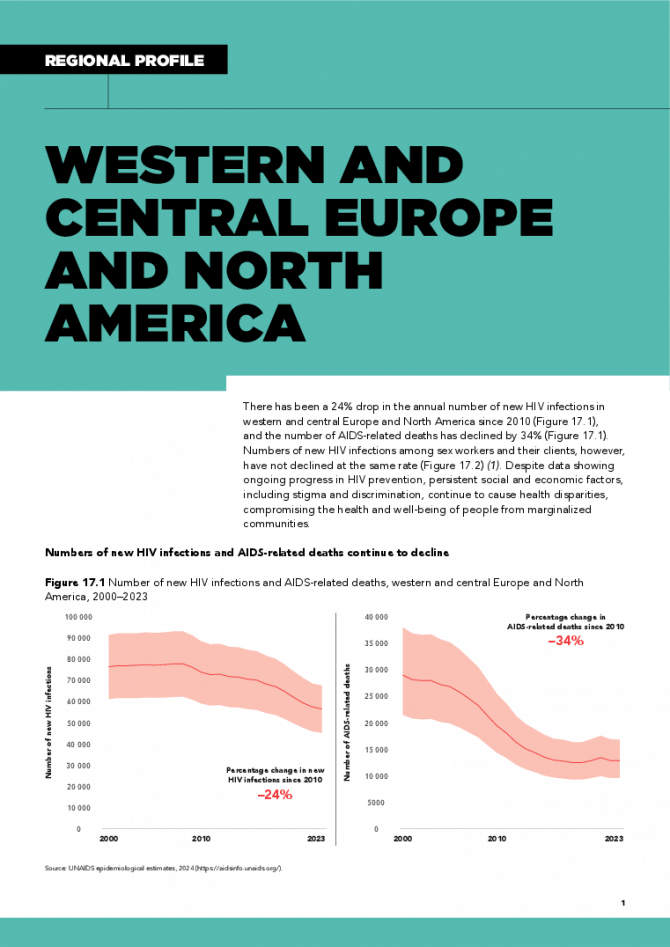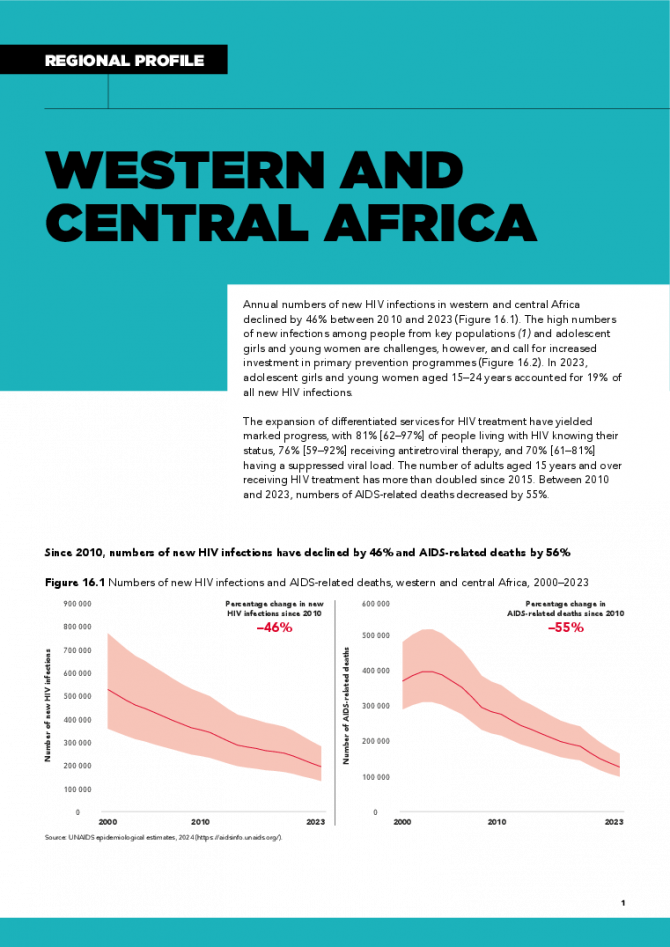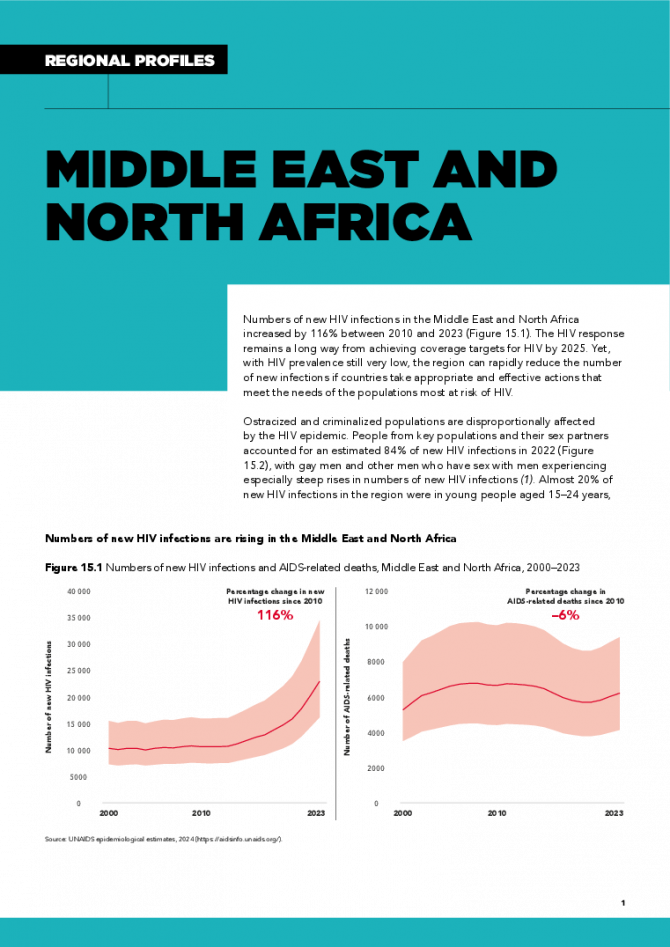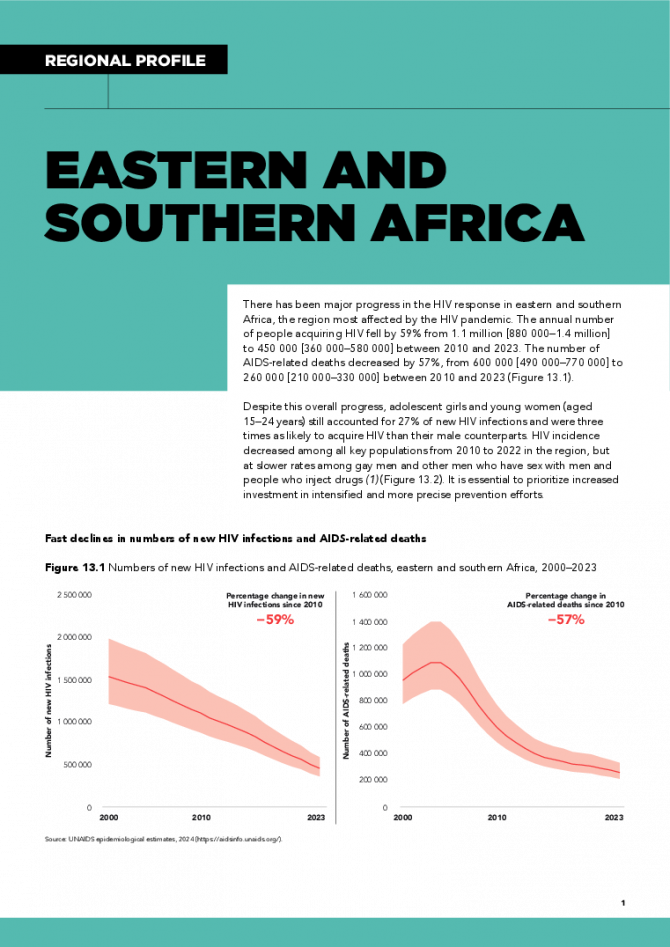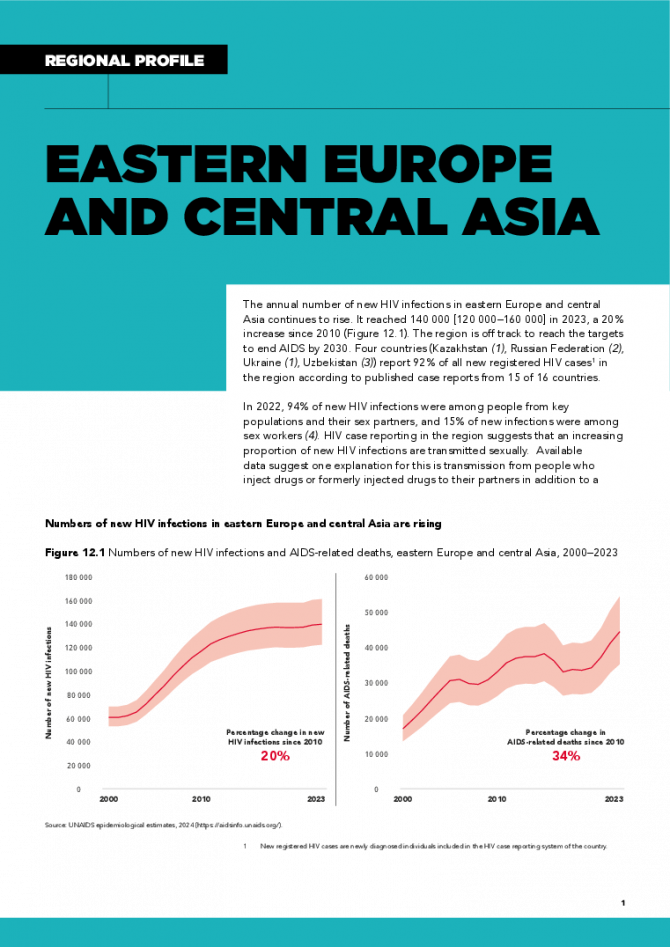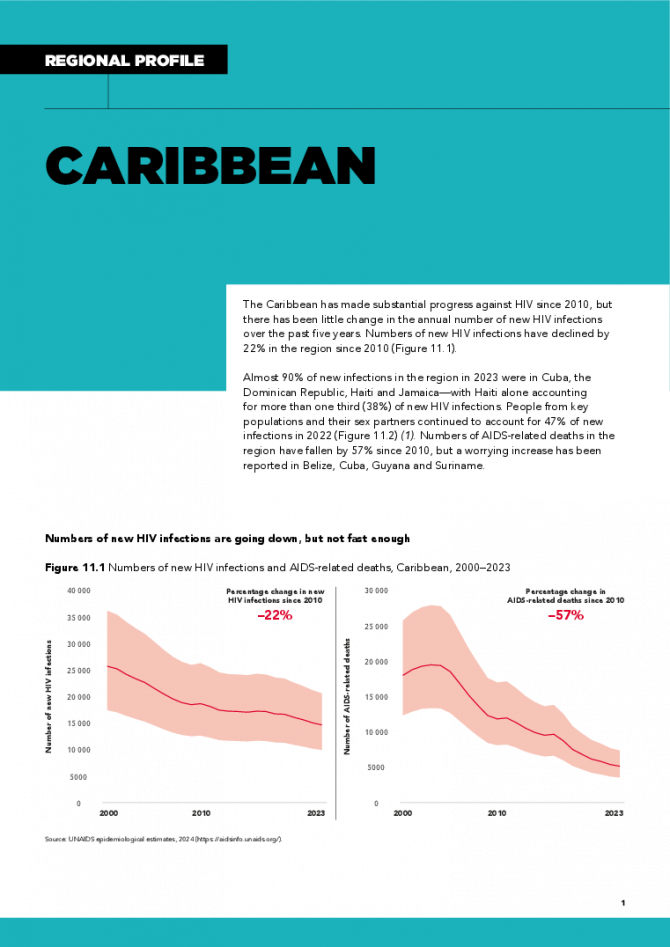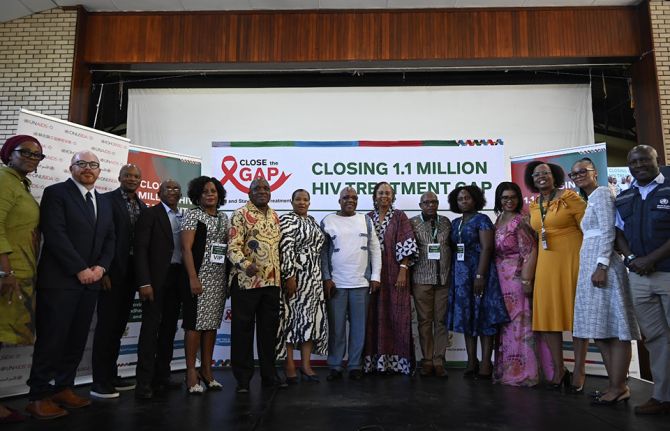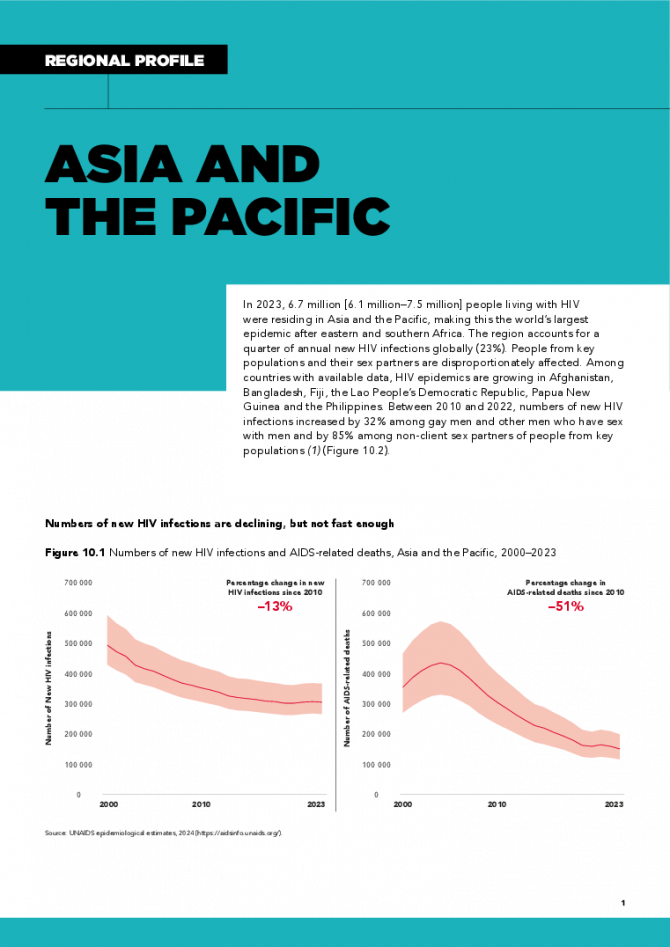HIV testing and counselling

Feature Story
HIV Epidemic in Mozambique and US Government Contribution (PEPFAR)
18 February 2025
18 February 2025 18 February 2025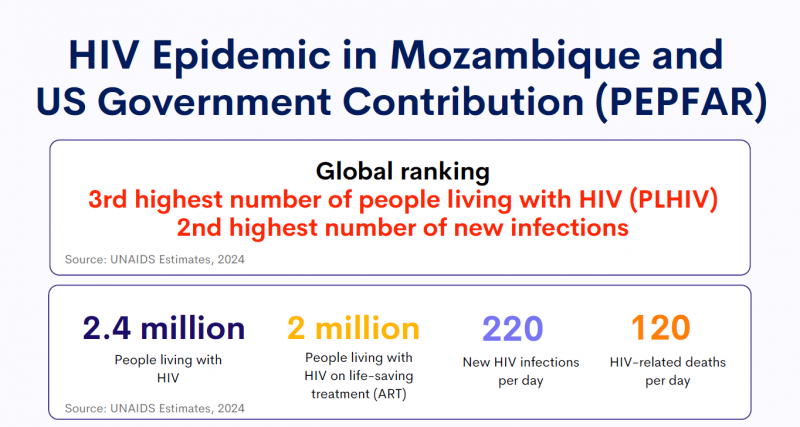
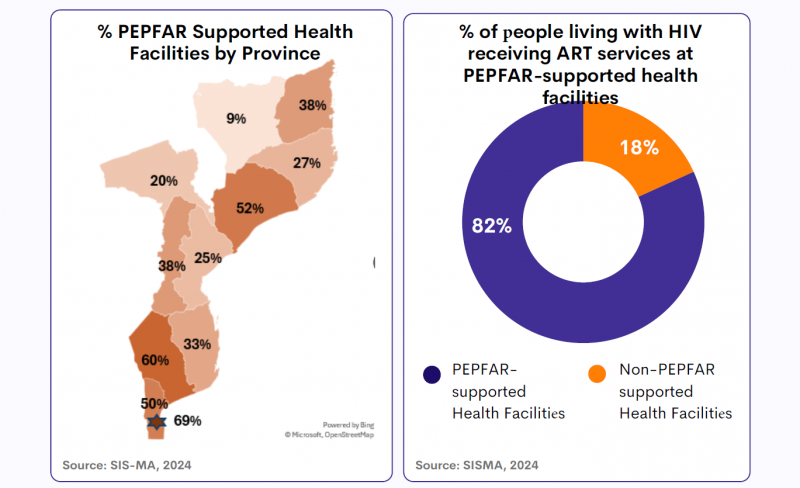
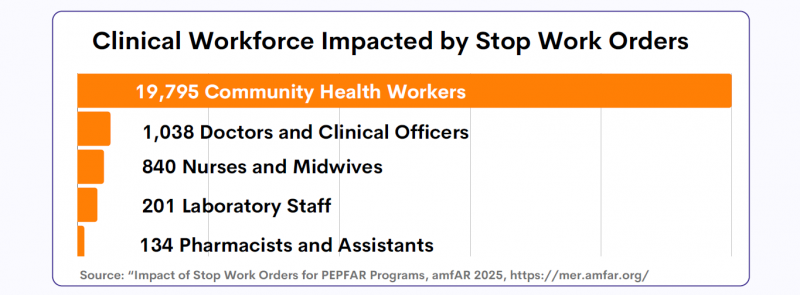
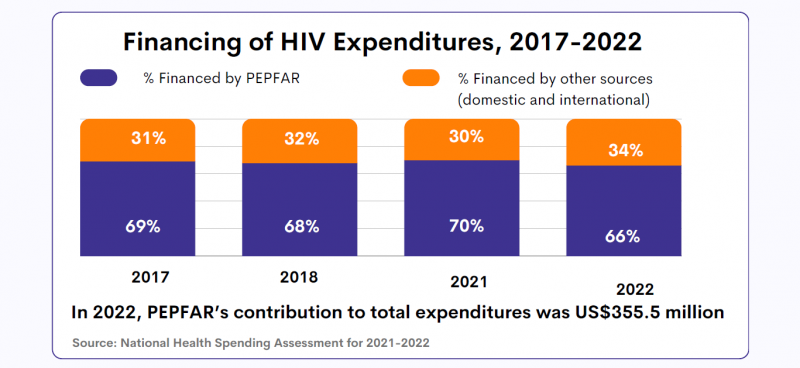
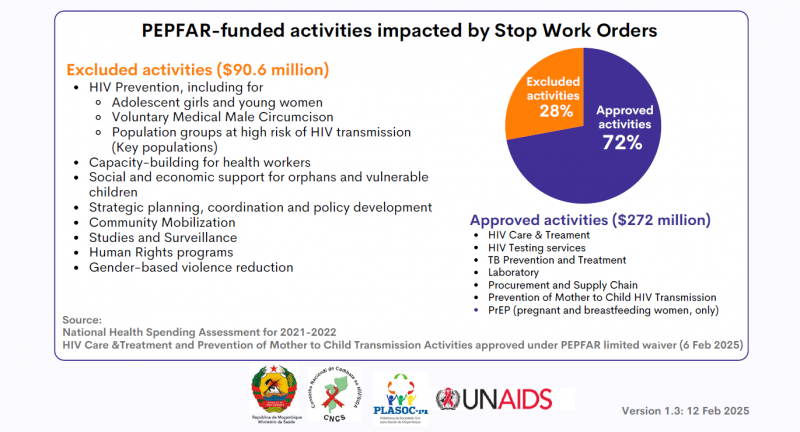

HIV epidemic in Mozambique and US Government contribution (PEPFAR)
Region/country
Related
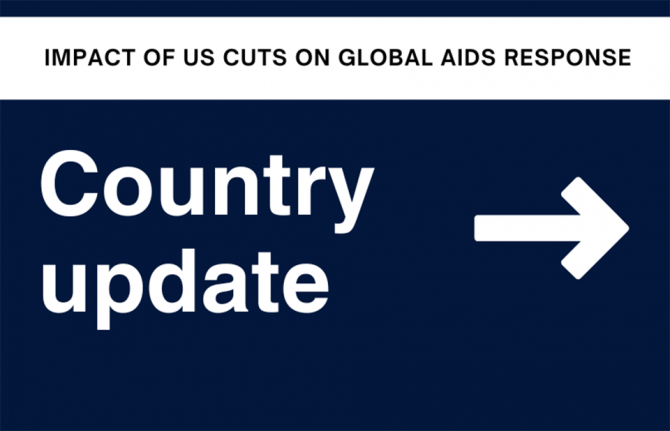 Impact of US funding cuts on HIV programmes in Kenya
Impact of US funding cuts on HIV programmes in Kenya

04 April 2025
 Impact of US funding cuts on HIV programmes in Togo
Impact of US funding cuts on HIV programmes in Togo

03 April 2025
 Impact of US funding cuts on HIV programmes in Burundi
Impact of US funding cuts on HIV programmes in Burundi

02 April 2025
Documents
UNAIDS data 2024
02 December 2024
Suggested citation. UNAIDS DATA 2024. Geneva: Joint United Nations Programme on HIV/AIDS; 2024. Licence: CC BY-NC-SA 3.0 IGO. Related: The 2024 global AIDS report The Urgency of Now: AIDS at a Crossroads, released 22 July 2024, is available here.
Related
What the data tell us: Projections for the HIV epidemic in western and central Europe and North America in 2030
28 March 2025
What the data tell us: Projections for the HIV epidemic in the Middle East and North Africa in 2030
28 March 2025
What the data tell us: Projections for the HIV epidemic in eastern Europe and central Asia in 2030
28 March 2025
What the data tell us: Projections for the HIV epidemic in Asia and the Pacific in 2030
28 March 2025
What the data tell us: Projections for the HIV epidemic in western and central Africa in 2030
28 March 2025
Documents
Take the rights path to end AIDS — World AIDS Day report 2024
26 November 2024
The world’s decades-long response to HIV is at an inflection point. Despite successes, the world is currently not on track to end AIDS as a public health threat by 2030. Press release | Download full report | Download short version
Related
What the data tell us: Projections for the HIV epidemic in western and central Europe and North America in 2030
28 March 2025
What the data tell us: Projections for the HIV epidemic in the Middle East and North Africa in 2030
28 March 2025
What the data tell us: Projections for the HIV epidemic in eastern Europe and central Asia in 2030
28 March 2025
What the data tell us: Projections for the HIV epidemic in Asia and the Pacific in 2030
28 March 2025
What the data tell us: Projections for the HIV epidemic in western and central Africa in 2030
28 March 2025
Documents
Western and Central Europe and North America regional profile — 2024 global AIDS update The Urgency of Now: AIDS at a Crossroads
22 July 2024
There has been a 24% drop in the annual number of new HIV infections in western and central Europe and North America since 2010, and the number of AIDS-related deaths has declined by 34%. Numbers of new HIV infections among sex workers and their clients, however, have not declined at the same rate. Despite data showing ongoing progress in HIV prevention, persistent social and economic factors, including stigma and discrimination, continue to cause health disparities, compromising the health and well-being of people from marginalized communities. Related links: New UNAIDS report shows AIDS pandemic can be ended by 2030, but only if leaders boost resources and protect human rights now | Full report
Related
What the data tell us: Projections for the HIV epidemic in western and central Europe and North America in 2030
28 March 2025
What the data tell us: Projections for the HIV epidemic in the Middle East and North Africa in 2030
28 March 2025
What the data tell us: Projections for the HIV epidemic in eastern Europe and central Asia in 2030
28 March 2025
What the data tell us: Projections for the HIV epidemic in Asia and the Pacific in 2030
28 March 2025
What the data tell us: Projections for the HIV epidemic in western and central Africa in 2030
28 March 2025
What the data tell us: Projections for the HIV epidemic in eastern and southern Africa in 2030
28 March 2025
 From violence to funding cuts, Asia Pacific women living with HIV face old and new challenges
From violence to funding cuts, Asia Pacific women living with HIV face old and new challenges

18 March 2025
 U=U can help end HIV stigma and discrimination. Here’s how
U=U can help end HIV stigma and discrimination. Here’s how

27 February 2025
Documents
Western and Central Africa regional profile — 2024 global AIDS update The Urgency of Now: AIDS at a Crossroads
22 July 2024
Annual numbers of new HIV infections in western and central Africa declined by 46% between 2010 and 2023. The high numbers of new infections among people from key populations and adolescent girls and young women are challenges, however, and call for increased investment in primary prevention programmes. In 2023, adolescent girls and young women aged 15–24 years accounted for 19% of all new HIV infections. The expansion of differentiated services for HIV treatment have yielded marked progress, with 81% [62–97%] of people living with HIV knowing their status, 76% [59–92%] receiving antiretroviral therapy, and 70% [61–81%] having a suppressed viral load. The number of adults aged 15 years and over receiving HIV treatment has more than doubled since 2015. Between 2010 and 2023, numbers of AIDS-related deaths decreased by 55%. Related links: New UNAIDS report shows AIDS pandemic can be ended by 2030, but only if leaders boost resources and protect human rights now | Full report
Related
What the data tell us: Projections for the HIV epidemic in western and central Europe and North America in 2030
28 March 2025
What the data tell us: Projections for the HIV epidemic in the Middle East and North Africa in 2030
28 March 2025
What the data tell us: Projections for the HIV epidemic in eastern Europe and central Asia in 2030
28 March 2025
What the data tell us: Projections for the HIV epidemic in Asia and the Pacific in 2030
28 March 2025
What the data tell us: Projections for the HIV epidemic in western and central Africa in 2030
28 March 2025
What the data tell us: Projections for the HIV epidemic in eastern and southern Africa in 2030
28 March 2025
 From violence to funding cuts, Asia Pacific women living with HIV face old and new challenges
From violence to funding cuts, Asia Pacific women living with HIV face old and new challenges

18 March 2025
 U=U can help end HIV stigma and discrimination. Here’s how
U=U can help end HIV stigma and discrimination. Here’s how

27 February 2025
Documents
Middle East and North Africa regional profile — 2024 global AIDS update The Urgency of Now: AIDS at a Crossroads
22 July 2024
Numbers of new HIV infections in the Middle East and North Africa increased by 116% between 2010 and 2023. The HIV response remains a long way from achieving coverage targets for HIV by 2025. Yet, with HIV prevalence still very low, the region can rapidly reduce the number of new infections if countries take appropriate and effective actions that meet the needs of the populations most at risk of HIV. Ostracized and criminalized populations are disproportionally affected by the HIV epidemic. People from key populations and their sex partners accounted for an estimated 84% of new HIV infections in 2022, with gay men and other men who have sex with men experiencing especially steep rises in numbers of new HIV infections. Almost 20% of new HIV infections in the region were in young people aged 15–24 years, the majority of them male (55%). These epidemic patterns underscore the need for scaled-up HIV interventions for people from key populations and especially young people, and for reducing the societal and structural barriers that limit their access to needed services. Related links: New UNAIDS report shows AIDS pandemic can be ended by 2030, but only if leaders boost resources and protect human rights now | Full report
Related
What the data tell us: Projections for the HIV epidemic in western and central Europe and North America in 2030
28 March 2025
What the data tell us: Projections for the HIV epidemic in the Middle East and North Africa in 2030
28 March 2025
What the data tell us: Projections for the HIV epidemic in eastern Europe and central Asia in 2030
28 March 2025
What the data tell us: Projections for the HIV epidemic in Asia and the Pacific in 2030
28 March 2025
What the data tell us: Projections for the HIV epidemic in western and central Africa in 2030
28 March 2025
What the data tell us: Projections for the HIV epidemic in eastern and southern Africa in 2030
28 March 2025
 From violence to funding cuts, Asia Pacific women living with HIV face old and new challenges
From violence to funding cuts, Asia Pacific women living with HIV face old and new challenges

18 March 2025
 U=U can help end HIV stigma and discrimination. Here’s how
U=U can help end HIV stigma and discrimination. Here’s how

27 February 2025
Documents
Eastern and Southern Africa regional profile — 2024 global AIDS update The Urgency of Now: AIDS at a Crossroads
22 July 2024
There has been major progress in the HIV response in eastern and southern Africa, the region most affected by the HIV pandemic. The annual number of people acquiring HIV fell by 59% from 1.1 million [880 000–1.4 million] to 450 000 [360 000–580 000] between 2010 and 2023. The number of AIDS-related deaths decreased by 57%, from 600 000 [490 000–770 000] to 260 000 [210 000–330 000] between 2010 and 2023. Despite this overall progress, adolescent girls and young women (aged 15–24 years) still accounted for 27% of new HIV infections and were three times as likely to acquire HIV than their male counterparts. HIV incidence decreased among all key populations from 2010 to 2022 in the region, but at slower rates among gay men and other men who have sex with men and people who inject drugs. It is essential to prioritize increased investment in intensified and more precise prevention efforts. Related links: New UNAIDS report shows AIDS pandemic can be ended by 2030, but only if leaders boost resources and protect human rights now | Full report
Related
What the data tell us: Projections for the HIV epidemic in western and central Europe and North America in 2030
28 March 2025
What the data tell us: Projections for the HIV epidemic in the Middle East and North Africa in 2030
28 March 2025
What the data tell us: Projections for the HIV epidemic in eastern Europe and central Asia in 2030
28 March 2025
What the data tell us: Projections for the HIV epidemic in Asia and the Pacific in 2030
28 March 2025
What the data tell us: Projections for the HIV epidemic in western and central Africa in 2030
28 March 2025
What the data tell us: Projections for the HIV epidemic in eastern and southern Africa in 2030
28 March 2025
 Impact of US funding cuts on HIV programmes in Uganda
Impact of US funding cuts on HIV programmes in Uganda

19 March 2025
Documents
Eastern Europe and Central Asia regional profile — 2024 global AIDS update The Urgency of Now: AIDS at a Crossroads
22 July 2024
The annual number of new HIV infections in eastern Europe and central Asia continues to rise. It reached 140 000 [120 000–160 000] in 2023, a 20% increase since 2010 . The region is off track to reach the targets to end AIDS by 2030. Four countries (Kazakhstan, Russian Federation, Ukraine, Uzbekistan) report 92% of all new registered HIV cases in the region according to published case reports from 15 of 16 countries. In 2022, 94% of new HIV infections were among people from key populations and their sex partners, and 15% of new infections were among sex workers. HIV case reporting in the region suggests that an increasing proportion of new HIV infections are transmitted sexually. Available data suggest one explanation for this is transmission from people who inject drugs or formerly injected drugs to their partners in addition to a growing recognition of transmission among men who have sex with men. Unsafe drug injecting practices are a key factor in the region’s epidemic, representing 27% of new HIV infections. Related links: New UNAIDS report shows AIDS pandemic can be ended by 2030, but only if leaders boost resources and protect human rights now | Full report
Related
 Communities in crisis: The collapse of HIV lifelines in Eastern Europe and Central Asia
Communities in crisis: The collapse of HIV lifelines in Eastern Europe and Central Asia

01 April 2025
What the data tell us: Projections for the HIV epidemic in western and central Europe and North America in 2030
28 March 2025
What the data tell us: Projections for the HIV epidemic in the Middle East and North Africa in 2030
28 March 2025
What the data tell us: Projections for the HIV epidemic in eastern Europe and central Asia in 2030
28 March 2025
What the data tell us: Projections for the HIV epidemic in Asia and the Pacific in 2030
28 March 2025
What the data tell us: Projections for the HIV epidemic in western and central Africa in 2030
28 March 2025
Documents
Caribbean regional profile — 2024 global AIDS update The Urgency of Now: AIDS at a Crossroads
22 July 2024
The Caribbean has made substantial progress against HIV since 2010, but there has been little change in the annual number of new HIV infections over the past five years. Numbers of new HIV infections have declined by 22% in the region since 2010. Almost 90% of new infections in the region in 2023 were in Cuba, the Dominican Republic, Haiti and Jamaica—with Haiti alone accounting for more than one third (38%) of new HIV infections. People from key populations and their sex partners continued to account for 47% of new infections in 2022. Numbers of AIDS-related deaths in the region have fallen by 57% since 2010, but a worrying increase has been reported in Belize, Cuba, Guyana and Suriname. Related links: New UNAIDS report shows AIDS pandemic can be ended by 2030, but only if leaders boost resources and protect human rights now | Full report
Related
What the data tell us: Projections for the HIV epidemic in western and central Europe and North America in 2030
28 March 2025
What the data tell us: Projections for the HIV epidemic in the Middle East and North Africa in 2030
28 March 2025
What the data tell us: Projections for the HIV epidemic in eastern Europe and central Asia in 2030
28 March 2025
What the data tell us: Projections for the HIV epidemic in Asia and the Pacific in 2030
28 March 2025
What the data tell us: Projections for the HIV epidemic in western and central Africa in 2030
28 March 2025
What the data tell us: Projections for the HIV epidemic in eastern and southern Africa in 2030
28 March 2025
 U=U can help end HIV stigma and discrimination. Here’s how
U=U can help end HIV stigma and discrimination. Here’s how

27 February 2025
Documents
Asia and the Pacific regional profile — 2024 global AIDS update The Urgency of Now: AIDS at a Crossroads
22 July 2024
In 2023, 6.7 million [6.1 million–7.5 million] people living with HIV were residing in Asia and the Pacific, making this the world’s largest epidemic after eastern and southern Africa. The region accounts for a quarter of annual new HIV infections globally (23%). People from key populations and their sex partners are disproportionately affected. Among countries with available data, HIV epidemics are growing in Afghanistan, Bangladesh, Fiji, the Lao People’s Democratic Republic, Papua New Guinea and the Philippines. Between 2010 and 2022, numbers of new HIV infections increased by 32% among gay men and other men who have sex with men and by 85% among non-client sex partners of people from key populations. Related links: New UNAIDS report shows AIDS pandemic can be ended by 2030, but only if leaders boost resources and protect human rights now | Full report
Related
What the data tell us: Projections for the HIV epidemic in western and central Europe and North America in 2030
28 March 2025
What the data tell us: Projections for the HIV epidemic in the Middle East and North Africa in 2030
28 March 2025
What the data tell us: Projections for the HIV epidemic in eastern Europe and central Asia in 2030
28 March 2025
What the data tell us: Projections for the HIV epidemic in Asia and the Pacific in 2030
28 March 2025
What the data tell us: Projections for the HIV epidemic in western and central Africa in 2030
28 March 2025
What the data tell us: Projections for the HIV epidemic in eastern and southern Africa in 2030
28 March 2025

